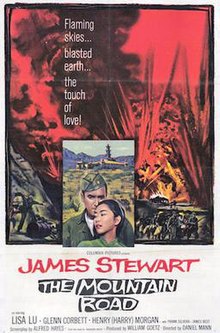The Mountain Road
| The Mountain Road | |
|---|---|

Original film poster
|
|
| Directed by | Daniel Mann |
| Produced by | William Goetz |
| Written by | Alfred Hayes |
| Based on |
The Mountain Road 1958 novel by Theodore H. White |
| Starring |
James Stewart Lisa Lu Glenn Corbett |
| Music by | Jerome Moross |
| Cinematography | Burnett Guffey |
| Edited by | Edward Curtiss |
| Distributed by | Columbia Pictures |
|
Release date
|
|
|
Running time
|
102 min, filmed in 1.85: 1 widescreen |
| Country | United States |
| Language | English |
The Mountain Road is a 1960 war film starring James Stewart and directed by Daniel Mann. Set in China and based on the 1958 novel of the same name by journalist-historian Theodore H. White, the film follows the attempts of a U.S. Army Major to destroy bridges and roads potentially useful to the Japanese during World War II. White's time covering China for Time magazine during the war led to an interview with former OSS Major Frank Gleason Jr., who served as head of a demolition crew that inspired the story and film. Gleason was later hired as an (uncredited) technical consultant for the film.
The film is a rather somber treatment of World War II and includes themes that were taboo for Hollywood during the war years, such as tensions between allies and racism among American troops. The protagonist is a frustrated and morally conflicted U.S. officer unsure about the value of his mission. For these reasons, The Mountain Road is often labeled anti-war. But it was made with the cooperation of the Pentagon, and it is much more respectful of the military as an institution than are the well-known anti-war films of the 1960s and '70s.
As a World War II combat veteran, Stewart had vowed never to make a war movie, concerned they were hardly ever realistic.The Mountain Road was the only war movie set during World War II in which he starred as a combatant. Stewart, however, had been featured in a wartime short, Winning Your Wings (1942) and in a civilian role in Malaya (1949). Harry Morgan, another cast member in The Mountain Road, later said he believed that Stewart made an "exception for this film because it was definitely anti-war."
In 1944, engineer Major Baldwin (James Stewart) is ordered to blow up an airfield as well as strategic roads and bridges to help American troops in China retreat from the Japanese army. General Loomis (Alan Baxter) is reluctant to send Baldwin due to his inexperience as a commander, but relents. Baldwin, accompanied by reluctant conscripts, Sergeant Michaelson (Harry Morgan), Prince (Mike Kellin), Lewis (Eddie Firestone), Miller (Rudy Bond) and Collins (Glenn Corbett), the demolition team's translator, Baldwin finds out from Colonel Li (Leo Chen), the Chinese commander that the Japanese are about to capture a munitions dump. Colonel Kwan (Frank Silvera) is assigned to the team but before they can embark, Madame Sue-Mei Hung (Lisa Lu), the American-educated widow of a Chinese officer, joins them, with Baldwin gradually becoming attracted to the widow.
...
Wikipedia
